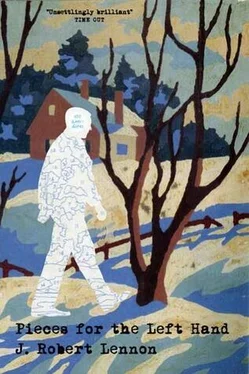The professor agreed to speak to the club, and was given a large honorarium, free transportation, and a lavish hotel suite complete with mini-gym and sauna. When at last he stood before the assembled lefties, he thanked them for their invitation, then proceeded to berate them for their smugness and stupidity. He pointed out that he was, in fact, right-handed, and only appeared left-handed in the photo because the newspaper had reversed the negative; if they had looked a little more closely, he said, they would have noticed that the writing on the chalkboard was backward. He told them that they should honor others for their achievements and not their genetic circumstances, and then, only minutes into his speech, stepped down from the dais and caught a cab to the airport.
When years later the professor lost his right arm in a highway crash, he was unsurprised to receive a flood of congratulatory letters, and the first in an endless stream of free “lefty” gift items that have appeared almost daily on his doorstep ever since. Far from being angry, he views this unfortunate turn of events as a kind of poetic justice, and even tried to apologize to the lefties’ club in a kind letter to its president. However, his speech had cut too deeply, and the lefties continue to bombard him with junk.
Meanwhile, the professor has learned to play a variety of left-hand pieces on the piano, and is said to be as dexterous with his left hand alone as he once was with both. He has also joined a national organization of people who have lost the use of one or more limbs, and is scheduled to speak at its next annual meeting.
When a local apartment fire claimed the lives of thirty-seven people, I was shocked and appalled. Later, when several residents were discovered to have been out of town, and the number of dead was revised to twenty-nine, I was somewhat relieved. At the same time, I felt faintly betrayed and disappointed, and wished that my grief and sympathy for the eight additional victims and their families had not gone to waste.
At a party we encountered a local movie critic, whose amusing and insightful column had long been the most noteworthy feature of our otherwise unremarkable daily newspaper. Late into the night, after we had all had several drinks, the critic recalled with stunning clarity a breakup scene between a man and woman which, in the film in question, had resulted in the dissolution of their family and years of financial and emotional strain for all involved. As described, the scene was characterized by high drama and superb acting, and the guests who had listened to the description all wanted to know the name of the movie. But the critic, addled either by drink or by an overabundance of film memories, was unable to remember.
Not long afterward, the critic’s column was discontinued, and he began to review local restaurants instead. But his new column seemed uninspired, the prose flat, the insights into local culture and cuisine shallow and unenlightening.
It was nearly a year before I saw the critic again. He appeared tired and sick, his clothes unwashed, his skin blotchy with age. I greeted him but he did not remember me, nor did he recall the party we both attended.
A mutual acquaintance, however, passed on a rumor that the critic had begun to lose his mind. Evidently he was telling people that he had experienced all manner of implausible adventures or had known and advised certain historical figures, many of them long dead. It appeared that the critic had begun to mistake events from the many films he had seen and reviewed for his own life experiences. When I related our encounter at the party, the acquaintance reported that the dramatic scene the critic described bore a strong resemblance to the man’s breakup with his first wife, and the consequent domestic chaos. It appeared, then, that his madness cut both ways.
It was not long before the restaurant column was canceled as well, and replaced by a syndicated column about home decorating.
Strange dreams recently visited a friend, whose family- and work-related stress had long ago consigned him to regular sessions with a psychologist, which sessions, despite their short-term efficacy, seemed to have done our friend very little lasting good. In his dreams, the friend was hard at work in a familiar setting, such as his office or his home, or conducting business over the phone or via computer in a public place, like an airport or train station. For a while our friend would do this work, with little evidence to suggest the experience was a dream, until he would be startled by a volley of high-pitched cries, and look up to find that he was under attack by monkeys. The monkeys would tear at his clothes and face, inflicting terrible pain, and just as he was about to perish, he would wake from the dream, screaming at the dream-monkeys and frightening his peacefully sleeping wife. From his description the monkeys seemed to be rhesus, or some other small variety.
When our friend related these dreams to his psychologist, the psychologist asked if he had any siblings. In fact, he had: he’d been born into a large family. Were his parents divorced? Sadly, they were. The psychologist nodded. Were you ever, he asked, sexually molested as a child? Our friend replied that of course he hadn’t been, that was a ridiculous suggestion. But the psychologist persisted. He believed that the monkeys represented sexual aggression; they tore at his clothes as might a rapist, and their small size made them resemble sperm. Our friend’s recent anxiety, the psychologist said, had uncovered repressed memories of sexual abuse, which his tender mind had tried to disguise as monkey attacks.
Our friend gave this analysis some thought: weeks of thought, in fact, during which he became nearly incapacitated with sadness and was forced to take extended sick leave from work. What finally broke this depression was a conversation he had one night with his mother. In utter despair at what he should do with his psychologist’s hypothesis, he told his mother about the dreams and asked her if she knew where they might have come from.
To his astonishment, she offered the information that, at a city zoo on his third birthday, he had in fact been attacked by monkeys. An inexperienced zoo worker had left a monkey house access door unlatched, and a pack of tiny monkeys had made a mad dash into our friend’s path, causing him some minor injuries in the process. At first our friend didn’t believe her, so absurd was the story, but she quickly faxed him a newspaper article on the incident, and told him that she and his father never mentioned it because it had been so upsetting for him at the time, and they didn’t want to burden him further. Besides, they had had lots of children, and could spare little emotional energy on a such a (relatively) harmless occurrence, which at any rate had only affected one child among many.
Last we heard, our friend had withdrawn from his therapy and was doing somewhat, if not markedly, better in his personal and professional life. The monkey dreams have not continued.
There were six students in our school play: Jason, Heather, David, Carol, Matt and me. But in the script, which our teachers had obtained from a catalog, our characters were given other names: Scott, Jenny, Robert, Melissa, Bill and Larry. Since the oldest of us was seven, we had never before been in a play, and the difficulty of memorizing our lines was compounded by the necessity of learning new names for both ourselves and the others. For weeks we struggled through rehearsals, slowly gaining ground. Then, at the last minute, our teachers, fearing a debacle, told us to forget the stage names and simply use our own.
Читать дальше










